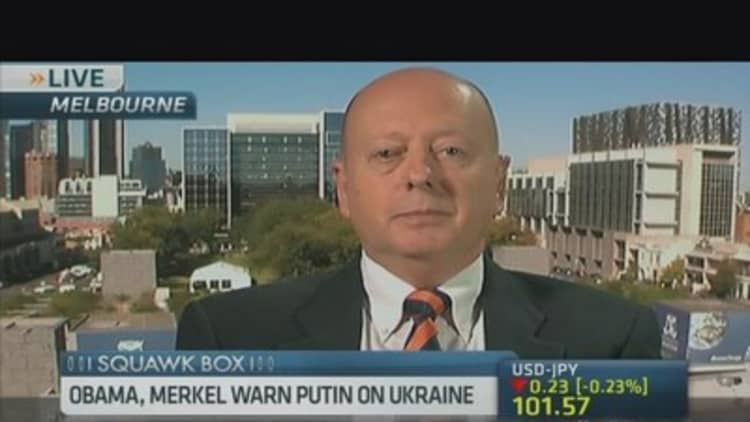
A bloodless Russian invasion of Ukrainian peninsular Crimea has prompted a spurt of risk aversion across global financial markets. But although geopolitical tensions have been described as being the highest since the 9/11 attacks, analysts told CNBC the threat of a full scale war remains limited.
Asian equity markets sold off, while safe-haven assets rallied in reaction to tensions surrounding Ukraine. Gold surged 1 percent, the Japanese yen strengthened to a near-one-month high of 101.26 per dollar and the Swiss franc touched a one-year high against the euro on Monday.
"The geopolitical uncertainty – the level of tension and the geopolitical order today – is worse than at any point we've seen since 9/11," said Ian Bremmer, president of Eurasia Group.
"Let's be very clear, it's a big hit on American credibility. It's a serious impact on major relations between the US and the Russians, and also the Europeans and the Russians. And it's something we will be dealing with for a long time as the Russians aren't going to back down," he added.
But despite the worrying levels of geopolitical tension, Bremmer told CNBC he still doubted the situation would escalate into a war.
(Read More: Crimean crisis: Russia holds most of the power against Ukraine)
"The Russians are vastly more interested in keeping Ukraine... [an interest stronger] than any potential…threat that could be made by the Americans or Europeans. This is a core interest for Russia... and frankly it is not for the Europeans or Americans," said Bremmer.
He also ruled out the possibility of Russia acting aggressively outside of the Ukraine.
"It's not as if Russia is going to start grabbing territory in other places, they can't. They are not influential, their economy is going to hell, there isn't the domestic support for it. But when we talk about Ukraine it's different," he said.
Ukraine mobilized on Sunday for war and called up its reserves, after Russian President Vladimir Putin threatened to invade in the biggest confrontation between Moscow and the West since the Cold War, Reuters reported on Sunday.
(Read More: Obama challenges Putin on 'clear violation' of Ukraine sovereignty)
Russia's invasion of Crimea – an isolated peninsula in the Black Sea mainly populated by ethnic Russians and home to a Moscow naval base – was condemned by the Group of 7 industrialized nations on Sunday. U.S. Secretary of State John Kerry has threatened Russia with sanctions and other economic consequences if it did not back down.
Investment professionals remained sanguine, however, and told CNBC that they were not concerned that the situation would escalate into a full blown war, which would have a long-lasting impact on markets.

"I think military involvement has to be very much a final step," said Leslie Holmes, professor at the School of Social and Political Sciences at University of Melbourne. "And I very much hope Putin is politically savvy to back off before we get to that stage because the Russian economy is not as strong as Russians think."
"The odds of this escalating into a full scale conflict that would really meaningfully rattle structural global markets are pretty low," added Joe Magyer, senior analyst at the Motley Fool.
(Read More: Asian stocks may fall, dollar rise as Ukraine crisis deepens)
"Essentially the Russians have a lot more interest in taking this land, they're prepared to fight for it and I don't think the U.S. is ultimately willing to stand up for it… They might unfriend them on Facebook but ultimately I don't think it's going to rattle the markets," he added.
Meanwhile, Richard Duncan, chief economist at Blackhorse Asset Management told CNBC the impact on markets would be "short term and contained."
"We may see more strength in the yen and also in gold but it's probably going to be a short-term reaction. I would expect the yen will depreciate, over the next few months to 105 [per dollar]," he added.
(Read More: Russian officials:"Fascists in power now in Ukraine")
Greater concerns now surround eastern swathes of the Ukraine, where most of the ethnic Ukrainians speak Russian as a native language.
Those areas saw violent protests on Saturday, with pro-Moscow demonstrators hoisting flags at government buildings and calling for Russia to defend them.
— By CNBC's Katie Holliday: Follow her on Twitter @hollidaykatie


